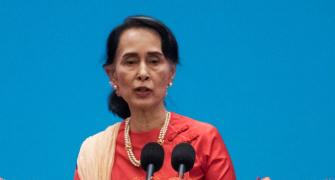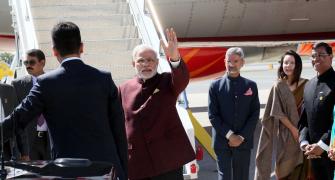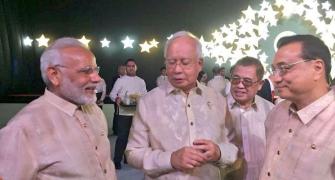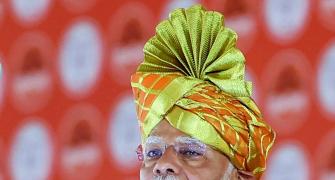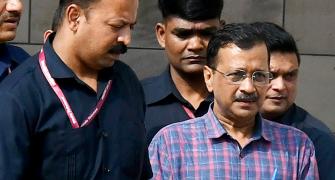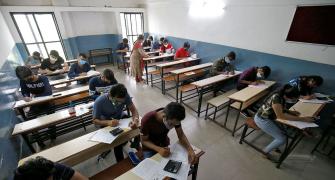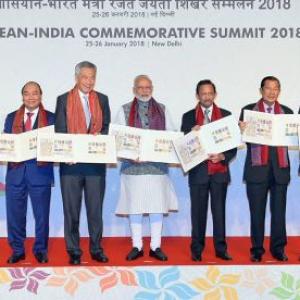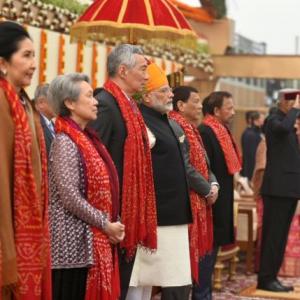Indonesia is not even counted as a next-door neighbour of India, though the southern-most tip of India is less than a hundred miles away from the northern-most tip of Indonesia.
Bringing Indonesia back in the mainstream of the Indian strategic calculus is a step long overdue, says Dr Rahul Mishra.

Millennia-old civilisational, societal and cultural linkages bind India and Indonesia together.
Bali Jatra, the traditional festival of Odisha, commemorates even today the voyages of Indian sailors to the Bali island of Indonesia.
More than seven decades ago, when Indonesia was emerging from the clutches of colonial rule as an independent nation, India proved itself as its strongest friend.
Such was the warmth between India and Indonesia back then that Sukarno called then Indian prime minister Jawaharlal Nehru his 'political father'.
Together, these two countries strived, albeit with scant success, to anchor a regional association of Afro-Asian nations in the mid-1950s.
However, India-Indonesia ties could not sustain the pressures of regional and global forces and despite repeated efforts, they drifted apart with such quantum that in contemporary mainstream discourse, Indonesia is not even counted as a next-door neighbour of India, though the southern-most tip of India is less than a hundred miles away from the northern-most tip of Indonesia.
While policymakers and strategic community have made some noises about it, bringing Indonesia back in the mainstream of Indian strategic calculus is a step long overdue.
Prime Minister Narendra D Modi's visit to Indonesia could help plug that gap in Indian strategic design.
In a bid to underscore the salience of maritime proximity between the two countries, Modi was to embark on his visit on board a ship from Port Blair to Sabang, a port city in the Aceh province of Indonesia.
However, those plans had to be cancelled due to logistics issues and bad weather in Sabang.
Had Modi been able to cover some distance by ship, he would have repeated what Nehru had done in 1950 when he travelled to Indonesia on INS Delhi.
Sabang is strategically located at the northern tip of Sumatra and is in close proximity to the Malacca Straits.
The distance between Sabang and the Nicobar Islands is around 350 miles.
With the Act East Policy, the maritime component has been reinforced in India's Indonesia policy. Both sides are forging a stronger maritime partnership.
It is no coincidence that Indonesia's Coordinating Minister for Maritime Affairs Luhut Pandjaitan visited India just a few days ago.
Interestingly, Pandjaitan mentioned giving India access to the Sabang Port. India is poised to develop the port.
India's presence in Sabang also means it would have better access to Malacca.
Indonesia's Global Maritime Fulcrum policy is in sync with India's Act East and the Indo-Pacific agenda.
Indonesia has been one of the most pro-active Southeast Asian countries which is keen to strengthen maritime linkages with India.
For one, during President Joko Widodo's visit to India in December 2016, both sides issued a separate maritime statement along with the usual joint statement.
China's trillion-dollar One Belt, One Road initiative, which is both a strategic and economic initiative, has driven other major stakeholders of the region to strengthen their presence in the regional maritime domain.
While India, Japan, Australia and the United States are attempting to revive the quadrilateral security dialogue, France too has expressed its interest in playing an active role in the Indo-Pacific region.
During his India visit, French President Emmanuel Macron hinted that India, Australia and France should cooperate to form a 'strategic axis' in the maritime sphere to maintain the strategic equilibrium.
Being the biggest country in the Indo-Pacific -- both in geographic and economic terms -- it is logical for Indonesia to play a major role in the region.
Jokowi's Global Maritime Fulcrum policy, announced in 2014, is a clear signal of Indonesian strategic objectives to play a greater role in the region.
Though Jokowi attended the Belt and Road Forum in Beijing in May 2017, Indonesia is concerned about OBOR.
As Pandjaitan said in India, 'We don't want to be controlled by the Belt and Road... We are also promoting our Global Maritime Fulcrum... It is to balance the One Belt, One Road. The GMF's 'balancing' with OBOR was to ensure that Indonesia remained non-aligned. We would like to be independent. We are too big to be leaning one way or the other.'
Such statements depict that Indonesia is no longer willing to settle for a low-key role in the regional maritime and strategic architecture.
These strategic priorities serve the long-term interests of both India and Indonesia -- the two major Indian Ocean littoral States.
For India, Indonesia's support will bolster its Act East Policy. One also hopes that Modi's visits to Indonesia and Singapore result in India joining the Malacca Strait Patrols which comprises Indonesia, Malaysia, Singapore and Thailand.
India has been trying to join the grouping, but is yet to achieve a breakthrough. Cooperation with these countries will be a leverage for India vis-à-vis China which is perceived as a cartographic aggressor, to say the least.
Indonesia is spotting itself in an increasingly adversarial position with China on the Natuna Islands.
In the past few months, Indonesia has conveyed that it is open to weighing its strategic options to ensure the safety of tje Natuna Islands which have a direct bearing on its own territorial sovereignty.
It has also been forthcoming in accepting the Indo-Pacific architecture propounded by Japan and the US, and actively endorsed by India and Australia to safeguard its maritime interests amidst China's growing assertiveness in the region.
India and Indonesia are mindful of China's overarching presence in the region.
The two democracies have repeatedly stated their preference to live in peace with China rather than getting dragged into strategic competition.
India is keen on exploring cooperation with like-minded countries in the region.
Modi's visit to and cooperation with Indonesia is a part of this strategy.
Dr Rahul Mishra is a senior lecturer at the University of Malaya, Kuala Lumpur.

